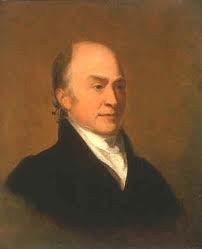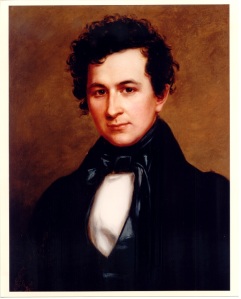John Quincy Adams was never a teetotaler. The eldest son of John and Abigail could even be considered a heavy drinker.
The Second Adams Generation
Having spent his formative years in the great capitals of Europe, John Quincy Adams (1767-1848) was introduced early on to the fruits of the vine. Most Europeans are.
Even in his Harvard years, JQA (as he referred to himself) was known to enjoy an evening of wine and song, roistering with his fellows in the taverns.
During his long diplomatic career, and even as President, it is said the wine or brandy flask was never far from his place at dinner. He was accused of nodding off, perhaps from a bit too much spirit, but JQA was never an alcoholic. Perhaps the genetic traits that caused addiction in his brothers had managed to escape him.
But John Quincy Adams and his wife Louisa Catherine Johnson had three sons who lived to maturity. Two fell under the old Smith-Adams curse. Only the third son would rise to meet their great expectations.
George Washington Adams and His Brother John
The eventual failures of George Washington Adams and his brother, John Adams II might be traced to their father’s appointment as Minister Plenipotentiary to St. Petersburg, Russia by President James Madison.
With very little notice, and over his wife Louisa’s bitter tears and anxieties, Mr. and Mrs. JQA left their older sons, then eleven and nine, with family, their education to be overseen by their grandparents John and Abigail. Their youngest son, Charles Francis went with his parents. He was barely two, and not fully weaned.
John Quincy and Louisa Adams would not see their older boys again for five years. By that time, they were half-grown men.
In 1815, John Quincy Adams received a plum appointment: Minister Plenipotentiary to England, the highest diplomatic office the country could offer. Louisa Adams, English by birth and upbringing, was delighted. George and John were sent for, and it was a happy family reunion.
But a Puritanical bloodline ran strong in the Adams family, and ran particularly cold and harsh in JQA. Perhaps because of his own parents’ expectations for his greatness, he had developed a powerful ambition, combined with unrelenting purpose and discipline. He expected no less from his sons.
Immediately dissatisfied by his sons’ inadequate education and moral deficiencies thus far, the demanding father spent hours creating detailed hour-by-hour schedules for the boys. No frivolity or idleness would be permitted. When they rebelled, as teenaged boys do, JQ merely tightened the tether. More moral lectures were preached. More detailed schedules were created. The young men became more and more discouraged.
Louisa Adams was helpless against her husband’s controlling ways.
George and John began to live in fear of displeasing their generally unpleasable father. And these were their happiest family years!
George Washington Adams: Uncle Charles’ Nephew

George Washington Adams (1801-1829), named for the country’s first president was a sensitive, poetic fellow, far more like his mother than his father. Nevertheless he went to Harvard and became a mediocre lawyer. He was handsome and charming and ripe for falling in love with Louisa’s niece, Mary Hellen, a flirtatious young woman who had made her home with Aunt and Uncle Adams when her parents died. After a whirlwind tease with Charles Francis, the youngest Adams son, Mary agreed to marry George, the eldest. When George returned to Massachusetts to make another half-hearted attempt at lawyering, it was “out of sight, out of mind” with Mary. Middle brother John was equally handsome. He was also available. He caught her eye, and she married him instead. George was now a failure in romance as well as in his profession, and particularly in his father’s eyes.
The same depression and same inadequacy of the Adams-ness that had afflicted JQ’s brother, the Uncle Charles he had never known, took hold of George with the same intensity and results. His drinking, his inertia and his need for the human affection he could never find, became a freefall.
In 1829, when JQA was about to retire as President, he summoned his wayward 28-year-old son to Washington. A despondent George dutifully booked passage on a steamship. Perhaps unable to face more of his father’s certain disapproval, and perhaps realizing that his life had become an unending abyss, he slipped over the railing, and was never seen again.
Louisa Adams insisted it was an accident. Others knew better.
John Adams II: Uncle Tom’s Nephew
If George Adams resembled his Uncle Charles, John Adams II (1803-34) seemed to follow in the same footsteps of JQ’s other brother, Thomas Adams, a more or less controlled alcoholic.
When John Quincy Adams was elected President, his middle son became his secretary, a common practice. (Since Presidents paid a secretary out-of-pocket, most of the early ones engaged family members.) Meanwhile, Mary Hellen, the President’s fickle young ward, went along as well. A romance between her and John, her fiancee’s brother, blossomed, much to the dismay of the President and First Lady who feared sorrowful repercussions from their older son’s disappointment.

Concerned that the romance was in imminent need of the blessings of clergy, Louisa insisted that John and Mary marry immediately. It was a small wedding. Neither George nor Charles Francis attended. The couple then went on to have two daughters, which seemed to have a happy effect on Grandpa JQ’s disposition. If sons (and presumably grandsons) were to be disciplined, little girls were to be pampered and petted.
But John Adams II failed in his professional efforts both in law and in business. Alcohol took its toll as it did with Uncle Thomas, and John would die of its complications at only thirty-one.
It is said that the shared grief over the early deaths of their two older sons began to mend long-strained relationship between John Quincy and Louisa Adams.
Sources:
Bobbe, Dorothie – Mr. & Mrs. John Quincy Adams – Minton Balch, 1850
Shepherd, Jack – Cannibals of the Heart – McGraw Hill, 1980
Unger, Harlow Giles – John Quincy Adams – DCapo Press, 2012


Reblogged this on Lenora's Culture Center and Foray into History.
Fascinating post. I’ve always been interested in John and Abigail Adams. Now I’ll be giving their son and his family a closer look.
Pingback: DiscoverNet | Presidential Children Who Were Troublemakers